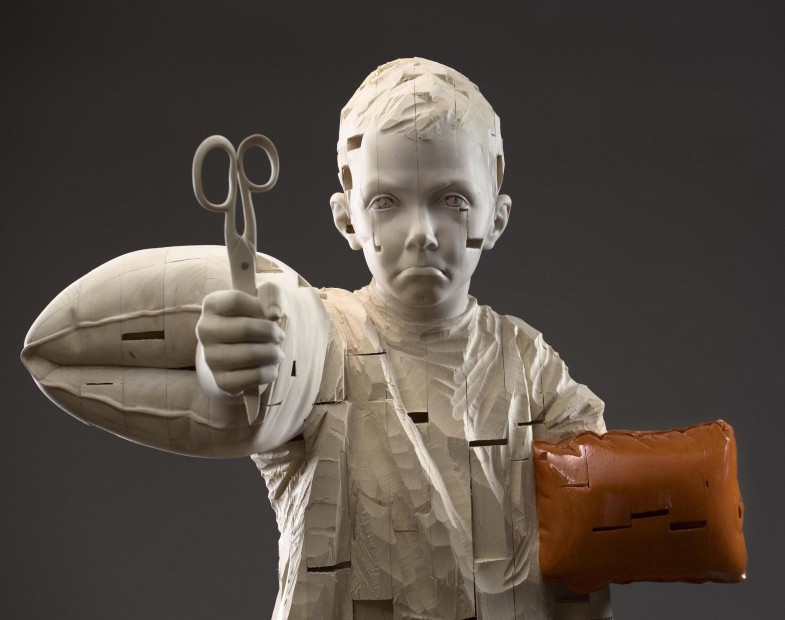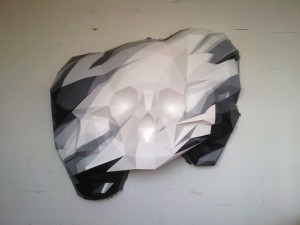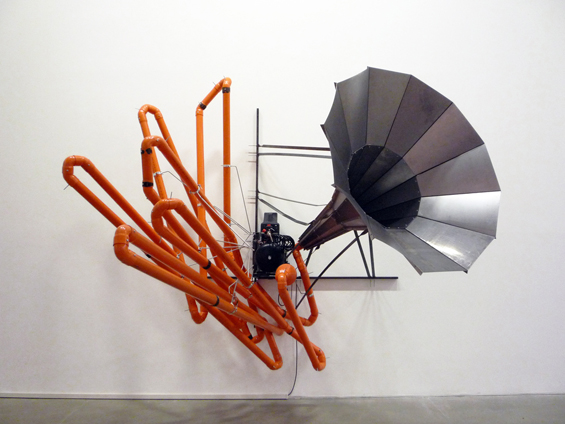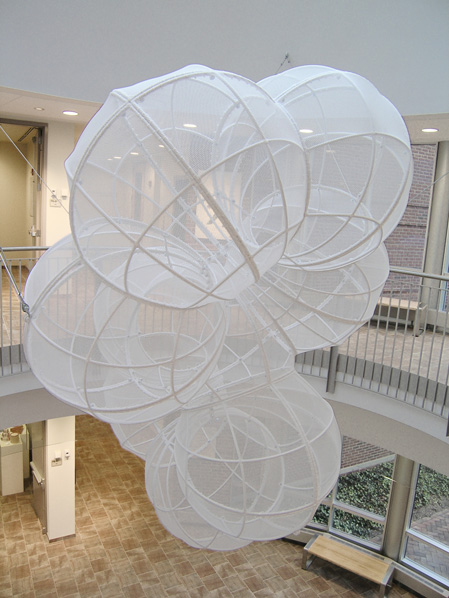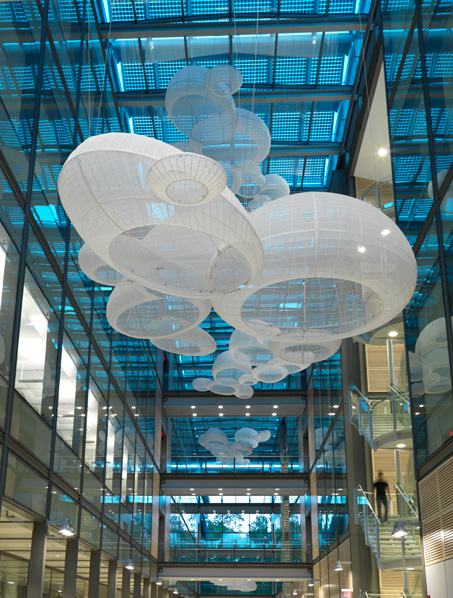-
Ghostly International presents Matthew Shlian
-
“A Place of Sun”
http://vimeo.com/40127569
Inspired by the BP oil catastrophe, this new work – a collaboration with artist Benjamin Heller, marries the visual and physical arts – sculpture and dance – to investigate entering and exiting space — adaptation and transformation — to show the resilience of both human and nonhuman nature in environments during the act of discovery/recovery – maybe not to be restored to pre-disaster conditions, but transformed and reborn anew.This work will focus on an inhospitable habitat that we render habitable in order to survive and have our place of sun.
Music: Karol Szymanowski
Lighting Design: Lacee Godman
Dancers: Miguel Anaya, Brittany Engel-Adams, Emilie Camacho, Raphaël Kaney Duverger,Trenard Mobley
-
They’re made out of meat
-
Writing Assignment – due Sept. 27
To prepare for Dustyn Martincich’s workshop with our class, watch the videos below (You’ll need to scroll down a bit for Johnson’s video) and address the following questions in a one or two paragraph response.
- According to Steven Johnson, where do good ideas and innovation come from?
- How does Wayne McGregor describe the process of choreography? What does McGregor think dance is all about?
- Why do you think your professor would include a dance workshop in a sculpture class? How do you think the workshop will be relevant to this course?
Please post your written response in the “Aquatic Uncle” category — sorry, I know this is semi-confusing.
Be sure to include your name in the title of your post so I can give you credit for your work.
-
Wayne McGregor: A choreographer’s creative process in real time
-
Gehard Demetz
-
After burning to the ground, the “Touchdown Jesus” sculpture is rebuilt as “Hug Me Jesus”
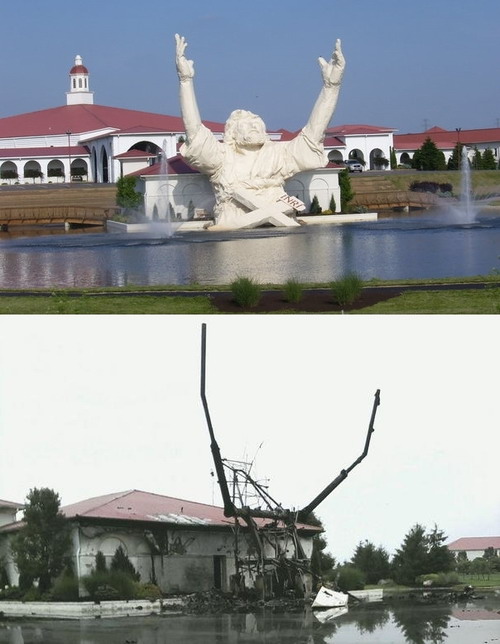
top: original sculpture pre-lightning strike — below: remaining armature after lightning strike The story behind these two sculptures, and their dynamic with the public, and the rationales behind depicting Jesus in one form and then another is as thought provoking as any work of academic conceptual sculpture. What does the church achieve by creating such a spectacle in a location visible from a busy highway? What are the implications of spending so much money on a sculpture like this — is it an important act of proselytization or an example of misdirected resources? Was it indeed an act of god that the first statue was struck by lightning and burnt to the ground, and if so, then what was god trying to tell us? What prompted the church officials to sculpt the second sculpture to reach out rather than up — how does this change the sculpture’s message? Obviously, the meaning of the three-story Jesus sculpture is subjectively determined by the viewer’s religious persuasion and past experience, but regardless of the viewer’s interpretation, the sculpture’s scale commands attention and provokes a litany of questions. What significance do read into the sculpture and its story? If you send a response to me by email I’ll add it to this post.
Read more:
USA Today article on the fateful lightning strike incident.
Cincinnati.com article on the new sculpture.
CNN article on the new sculpture.
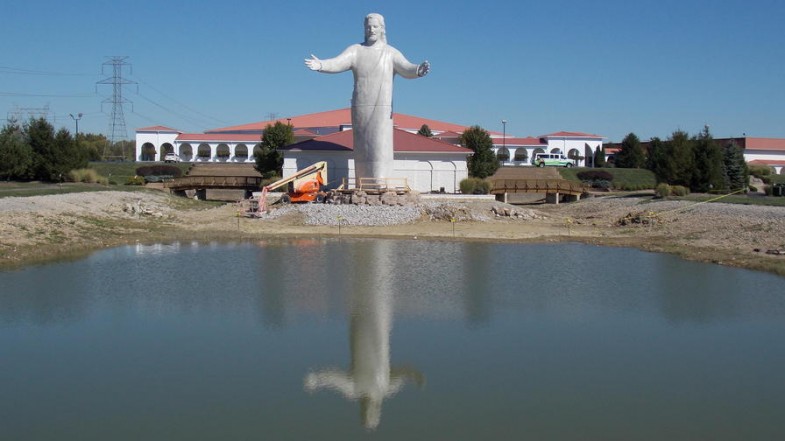
the new, recently installed sculpture http://www.youtube.com/watch?v=mUZ3d1tTbWg
-
WHERE GOOD IDEAS COME FROM by Steven Johnson
-
The New MakerBot Replicator Might Just Change Your World
Take the subway to an otherwise undistinguished part of Third Avenue in Brooklyn. Knock on the door. Wait for some stylishly disheveled young man to open it and let you in. You’ve arrived at the BotCave—the place where 125 factory workers are creating the future of manufacturing.
The BotCave is home to MakerBot, a company that for nearly four years has been bringing affordable 3-D printers to the masses… click here to read more
-
Untitled
-
Why Art Matters
by Anthony Bond OAM
I strongly believe that art can sometimes change the way we look at the world. It is all too easy to ridicule the preposterous claims often made for art in catalogue essays , however I reject the view that art merely excites aesthetic pleasure and should attempt nothing else. I have a strong commitment to the fundamental importance of aesthetic quality in art, but for me it is the means and not the end. I believe that art has to be grounded in the real world and enhance our understanding of ways of seeing…. click here to read more
-
new keypad code for the Sculpture Lab: 4201#
-
Antony Gormley: Sculpted space, within and without
-
Tom Sachs- How to Sweep
-
Alberto Tadiello’s Kenetic Sculptures
-
Another amazing Calvino read…
Since learning that Joe was assigning readings from Italo Calvino, I went back and have been re-reading my copy of “If on a winter’s night a traveler” and thought of this quote in relation to today’s discussion on his critique of technology (mainly why I brought up technology):
“It’s not too long, fortunately. Long novels written today are perhaps a contradiction: the dimension of time has been shattered, we cannot love or think except in fragments of time each of which goes off along its own trajectory and immediately disappears. We can rediscover the continuity of time only in the novels of that period when time no longer seemed stopped and did not yet seem to have exploded, a period that lasted no more than a hundred years. ”
This is what smartphones and portable devices have done to time- no longer do we have to attend concerts or movies or productions for their duration, we can simply access them from our phones at any point during the day (dont even have to wait til certain part of a song, can just fast forward to it).
At any point, it’s an interesting and innovative read about the process of writing as creation, and creation in general. Calvino’s like a more serious Kurt Vonnegut; entertaining and saavy, with hints of sarcasm.
-
Similar Techniques to current project
In high school, my Metals teacher assigned was a brass wire and pantyhose project, mainly to teach us how to form, bend, and solder brass rod together. We just did brass soldering in our class but some of the previous years had covered their brass wire forms in pantyhose that was sewed around the rods. I couldn’t find any exact examples but here’s a similar project in the archive:
http://www.scgsah.org/gallery/view/202
There’s not many examples online but here’s a photo of the basic construction/concept:
One of my professors at VCU, Kendall Buster, also does a similar process in her work:
-
Buckyballs and Disney World
A lot of the Radiolarian structures reminded me of carbon fullerenes, geodesic domes, and of course, coral reef:
Also saw mites listed in the book, so thought this was interesting:
-
2977# is the keypad code for the Sculpture Lab
-
Welcome to Sculpture 1!
